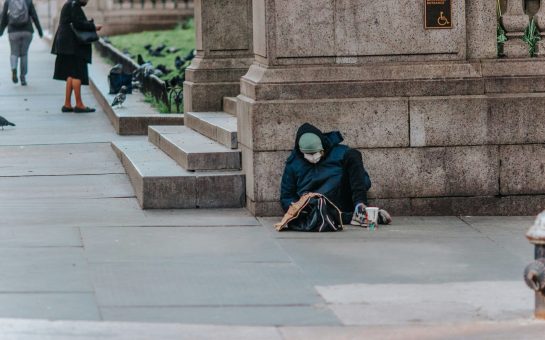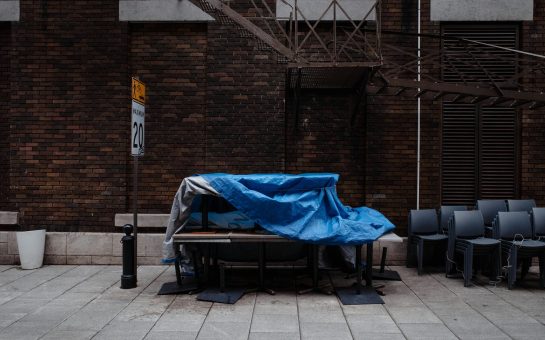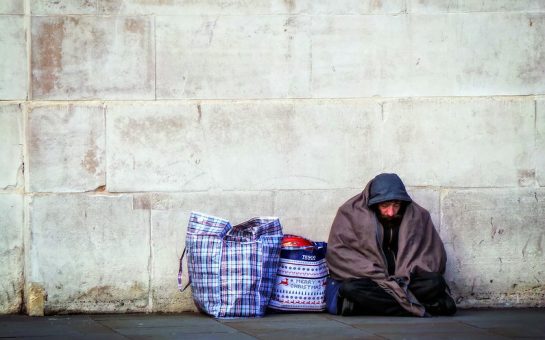Homelessness charities have had to drastically change how they work to reach and help those in need to tackle rough sleeping over the course of the pandemic.
Throughout this year, South West Londoner has been in touch with three homelessness charities working with those in need in the area to find out more about the impact of the pandemic and what the future is for the homeless.
There was unprecedented attention and political will behind getting people off the streets with the ‘Everyone In’ programme launch in March 2020, which resulted in renewed collaboration between authorities and charities.
While this ended in May this year, it led to new funding for transitional programmes like Next Steps and follow-on initiatives Rough Sleepers’ Accommodation Programme.
However, the Greater London Authority recently released a report with rough sleeping information from the multi-agency database Combined Homelessness and Information Network (CHAIN) which found that 11,018 people were seen sleeping rough in London during 2021/22 and this number has been increasing year on year.
On a fundamental level, the wide range of services charities offered over this time had to change as volunteers, staff and people in need had to reduce the risk of catching Covid and comply with social distancing, wearing masks, sanitizing and limits on gatherings in groups.
On a deeper level, although there never was such a thing as a typical rough sleeper, the number of people accessing the charities’ services and their needs became more complex and the future was more uncertain with no end of the pandemic in sight.
How those most vulnerable could and should be helped by these charities had to pivot alongside that shift.

Ace of Clubs is a charity based in Clapham which was started over 25 years ago to reach out to the most vulnerable.
Brother Mike C. Ss. R. (a Redemptorist) Director and Company Secretary of Ace of Clubs said it was “bittersweet” that the charity is still going strong a quarter of a century on because of the rising demand for its services.
He described Ace of Clubs as a “one-stop-shop” open access service offering hot meals, a food bank, showers, a clothing and toiletries bank, a laundry service, a needle exchange, education and training facilities, one-on-one case-working, weekend vet services, and a monthly NHS dental service and nurse.
These services had to change as volunteers, staff and people accessing the service had to reduce the risk of catching Covid and comply with social distancing, wearing masks, sanitizing and limits on gatherings in groups.
He told SWL: “Covid hit, and we reacted quickly and decided the key thing was to keep going.
“We reconfigured the food service with new access routes so people could queue outside for access to the kitchen hatch for hot food and the outside foodbank.
“There was no more dining room for lunch and dinner service, and we changed to a hot food takeaway service only on weekday lunchtimes which have been very popular and successful.
“Apart from food, as we do not want to be known just for this, we want to transform people’s lives and make a real change through education, training, benefits, housing.
“There is still a lot for us to do.”
The food is prepared from scratch every day, and on the day that SWL went to the Ace of Clubs there was corned beef hash and veggie chilli on the menu, with donations of flowers alongside.
People visited consistently throughout the day to get their packages and access services.
Brother Mike described a broad cross-section of people coming into Ace of Clubs who are not always on the street or homeless, but they can be impoverished or unemployed.
Before lockdown, Ace of Club’s daily average number of meals served was 98 and post-lockdown, the daily average is 150, with the highest daily total for hot meals in a single day being 196.
He said: “We are an open-access centre, and we have no waiting list, no registration, no restrictions.
“I am convinced that for some people, this is their only hot meal of the day.
“The humility of being poor can be very challenging – it is a real struggle to ask for help, especially from friends and family. There is an awkwardness and a real embarrassment to go home and ask. None of that applies at Ace of Clubs. There is no judgement- we are welcome and open.
“We still aim for the sense of a club, the sense of belonging, a place to feel safe and protected.”
SPEAR has been helping people experiencing homelessness to independence in south west London, including Richmond, Merton, Sutton, Kingston and Wandsworth, since 1987 and has been working tirelessly especially in the last year of the Covid crisis.
Mark Taylor, director of operations at SPEAR, spoke to SWL about how to some extent it was “business as usual” for the charity despite having to cope with a lot of change in services and demand, especially with how they can do their outreach work and how their volunteers and clients can coordinate in their Hub in Twickenham.
He explained how SPEAR had to negotiate a tricky balance between providing services to match their clients’ complex needs and build up trust with them, all while social distancing and limiting the numbers of people in their hostels and introducing one-way systems.
They also had to stop certain services they had previously like their popular clothing pop-in service and group activities for NHS feedback, therapy and pet volunteer sessions.
He said: “More and more things are now done online like applications, interviews, appointments and track & trace so we have started a digital inclusion initiative so we can source laptops, smartphones and wifi and also have volunteers train clients on the hardware.
“We help clients register for elections, fill in the census, make appointments, and provide more online services like digital courses in business studies and CV writing.”
Also, SPEAR introduced more medical-focussed support.
Taylor added: “We worked with the Covid vaccination programme with the NHS in a hotel in Putney so it is easily accessible and they are now able to invite anyone from outside the borough.
“We are also doing webinars about the vaccine hosted by NHS medical professionals with a niche for BAME and older people who may need specific reassurance.”
All of these changes came as fundraising dropped from not being able to host any events, however, their new food donation and essential item distribution network to those shielding was hugely successful and led to one of their volunteers and previous clients winning an award from the mayor.
In their hostels and HMOs (houses for multiple occupancy), they had to combat feelings of isolation as some of their clients had to shield in individual rooms rather than share as they had in the past.
SPEAR verified 658 rough sleepers since March 2020.
This breaks down by borough to 469 in Wandsworth, 142 in Richmond, 88 in Kingston and 19 in Sutton.
Taylor added: “Covid and Everyone in was an opportunity to connect with people who have no history of connecting.
“I am super proud of what we achieved with Everyone In as local authorities and SPEAR worked very well together.”
Glass Door is a charity based in London and have been in the south west area for about 20 years.
It has become the largest open access homeless shelter network in the country.
Melissa Kerschen, the Senior Communications Manager told SWL: “Absolutely, we drastically changed our services in response to the pandemic.
“We used to run this large network of communal night shelters but it quickly became evident that they were just too dangerous to run despite some of the safety measures we did originally put in place.”
To keep volunteers, staff, and guests safe, Glass Door had to find some alternatives and worked out an arrangement renting 100 rooms a night with a housing company called LHA which usually provided single rooms for young professionals and students in central London.
Kerschen clarified that this required a lot more infrastructure and planning but at the same time this this shift to individual rooms was ‘transformative’ in offering people stability and regular access to essentials like showers to have more confidence to go to work or job interviews.
Another element of Glass Door’s work is running a year-round casework system based on the individual needs of the person needing help, from help to opening a bank account and getting an ID to training and language lessons and help applying for the e-settlement scheme.
She added: “So we do have a higher percentage of people who may have may be non-UK nationals and don’t have access to the benefits system here.
“People fleeing domestic abuse and violence and all the various things that they don’t often find feel comfortable going through official channels, we just kind of have a no questions asked policy when people first arrive, and then we develop trust, and then find ways to support them.”
Drop-in centres for food and other essentials have also become a mainstay which had to shift to a takeout system in car parks and other outdoor locations where possible.
Glass Door has had to make some of its services virtual with more telephone calls and website hits than ever before with more women accessing the charity than before.
Kerschen added: “We’re expecting there will be a rise in demand again, and that is why we are looking at trying to reopen our night shelter so that we can have more bed spaces available for people who need it in the dead of winter.
“That is the fear. At the moment, we haven’t seen any kind of coherent long term strategy in tackling rough sleeping, which is one of the stated goals of the current administration, but there needs to be a plan.”
These three charities are preparing for a new wave of homelessness a year on from the government’s Everyone In campaign and with debates around the eviction ban, furlough and Universal Credit uplift ending.
In line with this, The Big Issue recently launched a new campaign to Stop Mass Homelessness as their statistics found that a family in the UK was being made homeless every three and a half hours.
The social enterprise is calling for urgent action on the government on nine demands to address long-term issues like social housing and legislation around protection for renters.
For anyone interested in finding out more about homelessness in south west London and what they can do, they can visit these pages below:
Ace of Clubs donation page.
SPEAR donation page.
Glass Door sleep out page.




